Get free scan and check if your device is infected.
Remove it nowTo use full-featured product, you have to purchase a license for Combo Cleaner. Seven days free trial available. Combo Cleaner is owned and operated by RCS LT, the parent company of PCRisk.com.
What is "CitiBank Email Virus"?
There are numerous spam campaigns online, including "CitiBank Email Virus". They are commonly used to spread other viruses, in this case, the Emotet virus. Scammers/cyber criminals behind the "CitiBank Email Virus" use an email that contains a link leading to download of a malicious .doc file.
Cyber criminals send this email to many people, hoping that a percentage of them will click the link and open the malicious document, which then goes on to infect computers with Emotet.
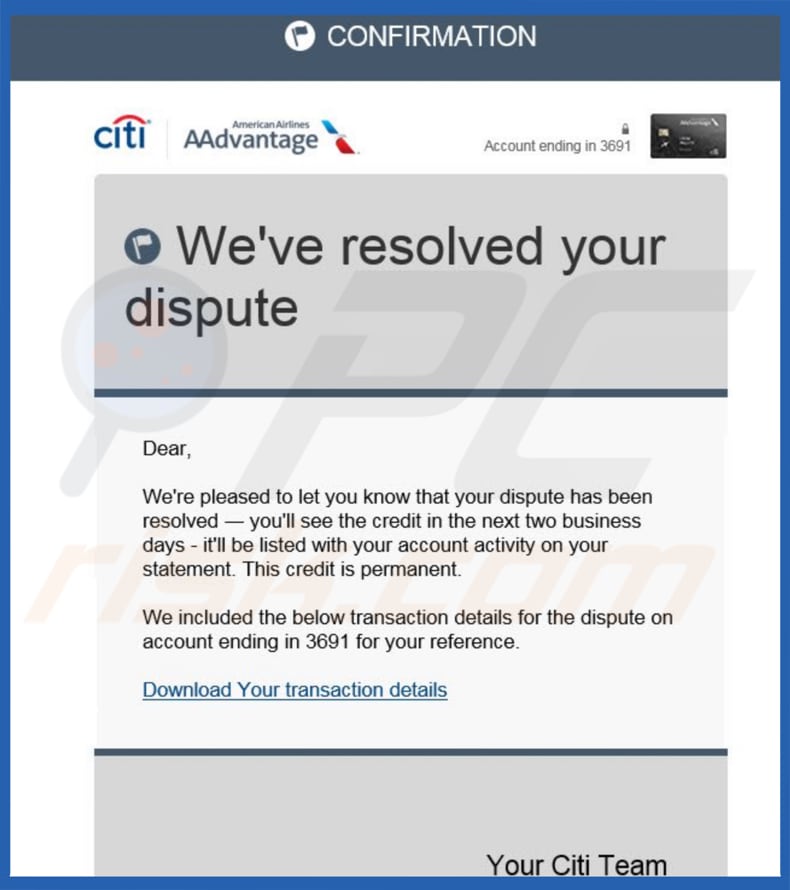
The "CitiBank Email Virus" spam campaign is used by cyber criminals who claim to be representatives of Citibank. These criminals often use well-known company names to trick more people into clicking links, opening attachments, or taking other actions that lead to computer infections.
Note that Citibank has nothing to do with this scam. The email gives the impression that Citibank has resolved a dispute and that you will see credit in your account within the next two business days. It also indicates that you can check the transaction details by clicking the "Download Your transaction details" link.
This is the link that we mentioned in our introduction. Once clicked, this link will download a Word (.doc) file that, according to cyber criminals, contains some transaction details. Opening this document gives permission for the Emotet virus to be installed.
This virus is categorized as high-risk malware that steals personal information (such as logins, passwords, browsing-related data, and so on).
Having your computer infected with this virus might lead to other infections (such as ransomware-type virus infections) and privacy issues, financial loss, and so on. If you have already opened "CitiBank Email Virus" attachments, immediately scan the system with a reputable anti-virus/anti-spyware suite and eliminate all detected threats.
| Name | CitiBank spam |
| Threat Type | Trojan, Password stealing virus, Banking malware, Spyware |
| Symptoms | Trojans are designed to stealthily infiltrate victim's computer and remain silent thus no particular symptoms are clearly visible on an infected machine. |
| Distribution methods | Infected email attachments, malicious online advertisements, social engineering, software cracks. |
| Damage | Stolen banking information, passwords, identity theft, victim's computer added to a botnet. |
| Malware Removal (Windows) |
To eliminate possible malware infections, scan your computer with legitimate antivirus software. Our security researchers recommend using Combo Cleaner. Download Combo CleanerTo use full-featured product, you have to purchase a license for Combo Cleaner. 7 days free trial available. Combo Cleaner is owned and operated by RCS LT, the parent company of PCRisk.com. |
Spam campaigns like "CitiBank Email Virus" can spread various viruses. Some examples of other possible infections are FormBook, Adwind, TrickBot, and AZORult. All cause privacy/financial issues and other serious problems. We strongly recommend that you eliminate these viruses immediately.
How did "CitiBank Email Virus" infect my computer?
As mentioned in our introduction, many spam campaigns are similar to "CitiBank Email Virus" including, for example, "IRS Online Email Virus", "Pricewaterhouse Coopers", "Ernst & Young", and "BMO account report". Frequently, spam email campaigns of this type proliferate viruses through malicious attachments.
In this case, cyber criminals present a link that downloads a .doc (Microsoft Word) document. If opened, this attachment asks for permission to enable macros commands. These commands, if enabled, allow malicious Word attachment to download/install the Emotet virus.
Note, however, that this attachment targets only Microsoft Windows users. Therefore, if the document (.doc) is opened using a program other than a Microsoft Word product, it will not be able to download and install viruses.
How to avoid installation of malware?
To avoid high-risk virus infections, browse the web and open emails (especially email attachments) with caution. If you have received an email from an unknown/suspicious email address, carefully inspect the email. If it seems irrelevant, do not open the attachment or click any provided link.
Have reputable anti-virus and anti-spyware software installed. These programs can prevent viruses from being downloaded and installed. If you have already opened a "CitiBank Email Virus" attachment, we recommend running a scan with Combo Cleaner Antivirus for Windows to automatically eliminate infiltrated malware.
Text presented in the "CitiBank Email Virus" email message:
CONFIRMATION
American Airlines AAdvantage
Account ending in 3691
We've resolved your dispute
Dear,
We're pleased to let you know that your dispute has been resolved - you'll see the credit in the next two business days - it'll be listed with your account activity on your statement. This credit is permanent.
We included the below transaction details for the dispute on account ending in 3691 for your reference.
Download your transaction details.
Your Citi Team
Malicious attachment distributed via "CitiBank Email Virus" spam campaign:
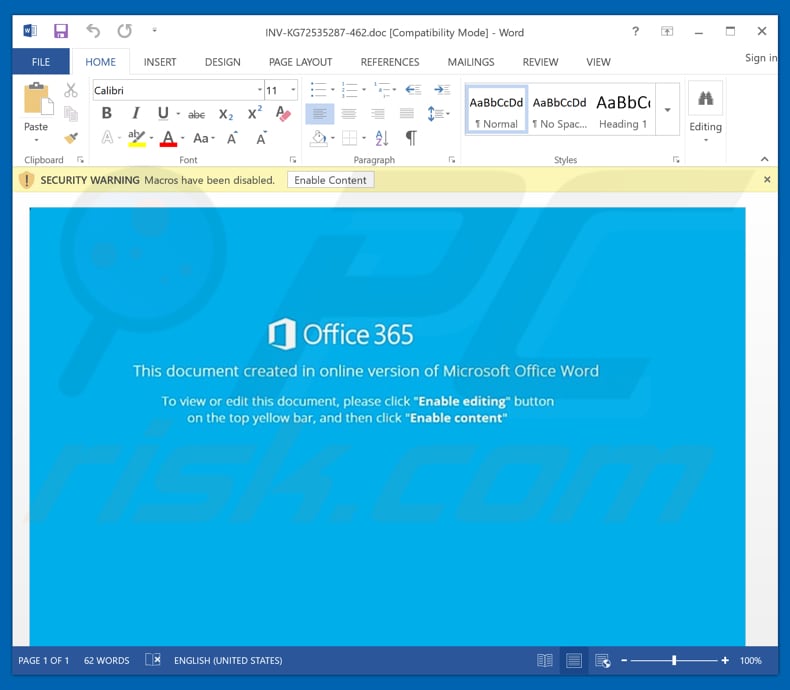
Another variant of CitiBank email spam campaign now distributing Remcos RAT:
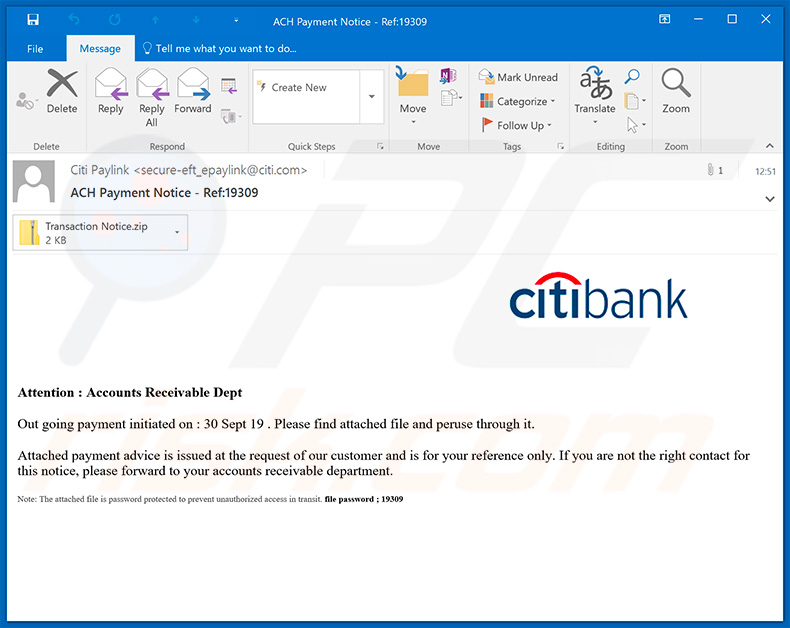
Text presented within this email:
Subject: ACH Payment Notice - Ref:19309
Attachment: Transaction Notice.zipAttention : Accounts Receivable Dept
Out going payment initiated on : 30 Sept 19 . Please find attached file and peruse through it.
Attached payment advice is issued at the request of our customer and is for your reference only. If you are not the right contact for this notice, please forward to your accounts receivable department.
Note: The attached file is password protected to prevent unauthorized access in transit. file password ; 19309
Another malicious CitiBank spam email which distributes Agent Tesla RAT (the malicious attachment is "EDG95320200205005000471_126_953_pdf_ace"):
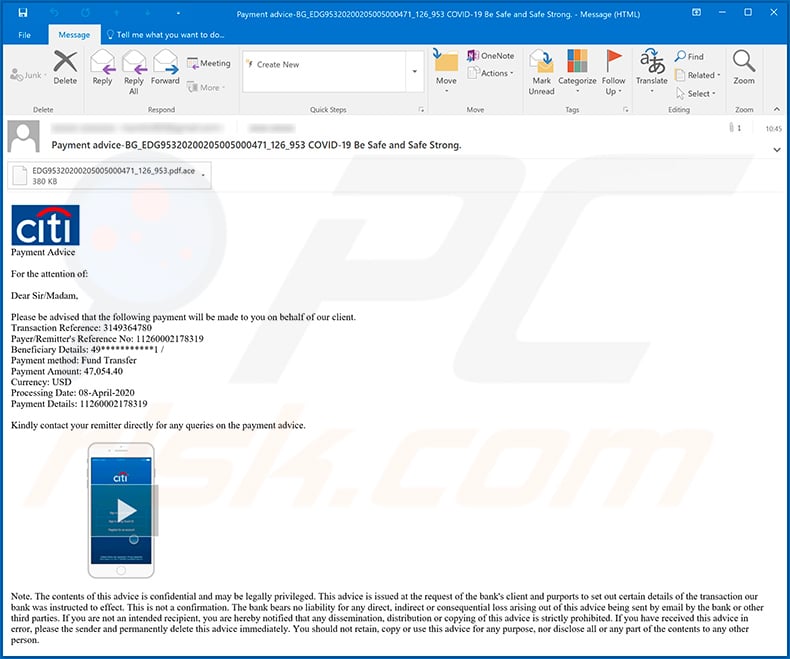
Text presented within this email:
Subject: Payment advice-BG_EDG95320200205005000471_126_953 COVID-19 Be Safe and Safe Strong.
Payment Advice
For the attention of:
Dear Sir/Madam,
Please be advised that the following payment will be made to you on behalf of our client.
Transaction Reference: 3149364780
Payer/Remitter's Reference No: 11260002178319
Beneficiary Details: 49***********1 /
Payment method: Fund Transfer
Payment Amount: 47,054.40
Currency: USD
Processing Date: 08-April-2020
Payment Details: 11260002178319Kindly contact your remitter directly for any queries on the payment advice.
Note. The contents of this advice is confidential and may be legally privileged. This advice is issued at the request of the bank's client and purports to set out certain details of the transaction our bank was instructed to effect. This is not a confirmation. The bank bears no liability for any direct, indirect or consequential loss arising out of this advice being sent by email by the bank or other third parties. If you are not an intended recipient, you are hereby notified that any dissemination, distribution or copying of this advice is strictly prohibited. If you have received this advice in error, please the sender and permanently delete this advice immediately. You should not retain, copy or use this advice for any purpose, nor disclose all or any part of the contents to any other person.
Screenshot of a malicious CitiBank-themed Excel document which injects Remcos RAT into the system:
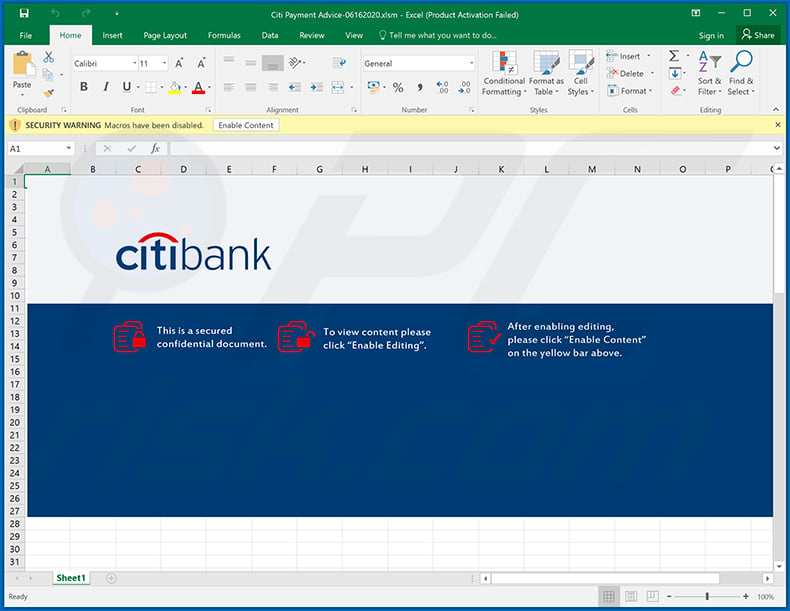
Another example of CitiBank-themed spam email:
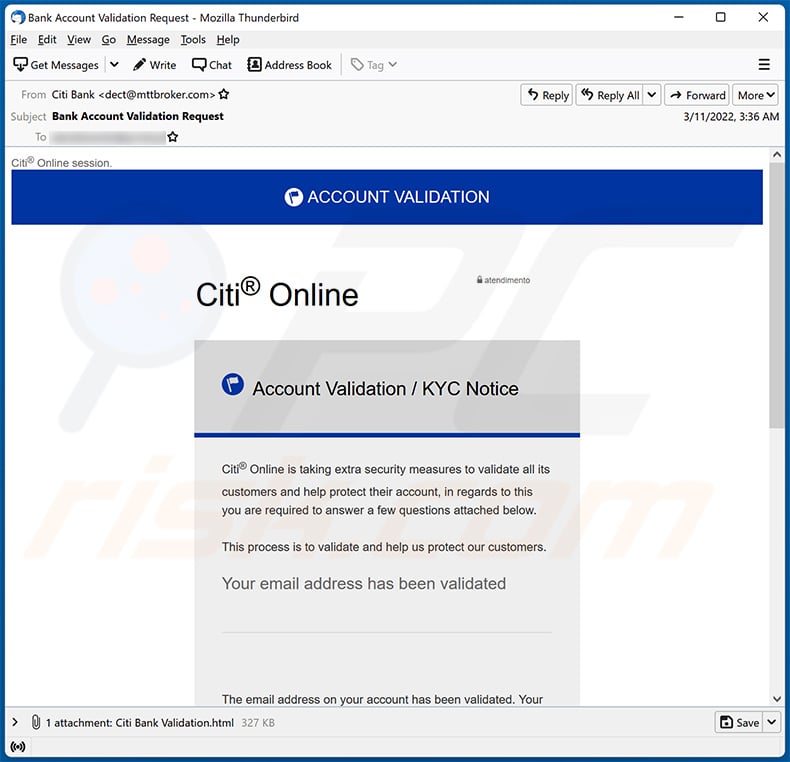
Text presented within:
Subject: Bank Account Validation Request
Citi® Online session.
ACCOUNT VALIDATION
Citi® OnlineAccount Validation / KYC Notice
Citi® Online is taking extra security measures to validate all its customers and help protect their account, in regards to this you are required to answer a few questions attached below.This process is to validate and help us protect our customers.
Your email address has been validated
The email address on your account has been validated. Your future communications will be sent to this address.
.Please note: Depending on the activity taken in Citi Online, and when those activities were completed, you may receive additional emails.
Privacy & Security
.The account information near the lock icon at the top of this email helps verify that it was sent by Citi.
This email is to keep you informed about your Citibank, including service updates and other information about your account. Please do not reply to this service email.Citi is at your side before, during and after every purchase.
Your Citi Team
Instant automatic malware removal:
Manual threat removal might be a lengthy and complicated process that requires advanced IT skills. Combo Cleaner is a professional automatic malware removal tool that is recommended to get rid of malware. Download it by clicking the button below:
DOWNLOAD Combo CleanerBy downloading any software listed on this website you agree to our Privacy Policy and Terms of Use. To use full-featured product, you have to purchase a license for Combo Cleaner. 7 days free trial available. Combo Cleaner is owned and operated by RCS LT, the parent company of PCRisk.com.
Quick menu:
- What is CitiBank spam?
- Types of malicious emails.
- How to spot a malicious email?
- What to do if you fell for an email scam?
Types of malicious emails:
![]() Phishing Emails
Phishing Emails
Most commonly, cybercriminals use deceptive emails to trick Internet users into giving away their sensitive private information, for example, login information for various online services, email accounts, or online banking information.
Such attacks are called phishing. In a phishing attack, cybercriminals usually send an email message with some popular service logo (for example, Microsoft, DHL, Amazon, Netflix), create urgency (wrong shipping address, expired password, etc.), and place a link which they hope their potential victims will click on.
After clicking the link presented in such email message, victims are redirected to a fake website that looks identical or extremely similar to the original one. Victims are then asked to enter their password, credit card details, or some other information that gets stolen by cybercriminals.
![]() Emails with Malicious Attachments
Emails with Malicious Attachments
Another popular attack vector is email spam with malicious attachments that infect users' computers with malware. Malicious attachments usually carry trojans that are capable of stealing passwords, banking information, and other sensitive information.
In such attacks, cybercriminals' main goal is to trick their potential victims into opening an infected email attachment. To achieve this goal, email messages usually talk about recently received invoices, faxes, or voice messages.
If a potential victim falls for the lure and opens the attachment, their computers get infected, and cybercriminals can collect a lot of sensitive information.
While it's a more complicated method to steal personal information (spam filters and antivirus programs usually detect such attempts), if successful, cybercriminals can get a much wider array of data and can collect information for a long period of time.
![]() Sextortion Emails
Sextortion Emails
This is a type of phishing. In this case, users receive an email claiming that a cybercriminal could access the webcam of the potential victim and has a video recording of one's masturbation.
To get rid of the video, victims are asked to pay a ransom (usually using Bitcoin or another cryptocurrency). Nevertheless, all of these claims are false - users who receive such emails should ignore and delete them.
How to spot a malicious email?
While cyber criminals try to make their lure emails look trustworthy, here are some things that you should look for when trying to spot a phishing email:
- Check the sender's ("from") email address: Hover your mouse over the "from" address and check if it's legitimate. For example, if you received an email from Microsoft, be sure to check if the email address is @microsoft.com and not something suspicious like @m1crosoft.com, @microsfot.com, @account-security-noreply.com, etc.
- Check for generic greetings: If the greeting in the email is "Dear user", "Dear @youremail.com", "Dear valued customer", this should raise suspiciousness. Most commonly, companies call you by your name. Lack of this information could signal a phishing attempt.
- Check the links in the email: Hover your mouse over the link presented in the email, if the link that appears seems suspicious, don't click it. For example, if you received an email from Microsoft and the link in the email shows that it will go to firebasestorage.googleapis.com/v0... you shouldn't trust it. It's best not to click any links in the emails but to visit the company website that sent you the email in the first place.
- Don't blindly trust email attachments: Most commonly, legitimate companies will ask you to log in to their website and to view any documents there; if you received an email with an attachment, it's a good idea to scan it with an antivirus application. Infected email attachments are a common attack vector used by cybercriminals.
To minimise the risk of opening phishing and malicious emails we recommend using Combo Cleaner Antivirus for Windows.
Example of a spam email:

What to do if you fell for an email scam?
- If you clicked on a link in a phishing email and entered your password - be sure to change your password as soon as possible. Usually, cybercriminals collect stolen credentials and then sell them to other groups that use them for malicious purposes. If you change your password in a timely manner, there's a chance that criminals won't have enough time to do any damage.
- If you entered your credit card information - contact your bank as soon as possible and explain the situation. There's a good chance that you will need to cancel your compromised credit card and get a new one.
- If you see any signs of identity theft - you should immediately contact the Federal Trade Commission. This institution will collect information about your situation and create a personal recovery plan.
- If you opened a malicious attachment - your computer is probably infected, you should scan it with a reputable antivirus application. For this purpose, we recommend using Combo Cleaner Antivirus for Windows.
- Help other Internet users - report phishing emails to Anti-Phishing Working Group, FBI’s Internet Crime Complaint Center, National Fraud Information Center and U.S. Department of Justice.
Share:

Tomas Meskauskas
Expert security researcher, professional malware analyst
I am passionate about computer security and technology. I have an experience of over 10 years working in various companies related to computer technical issue solving and Internet security. I have been working as an author and editor for pcrisk.com since 2010. Follow me on Twitter and LinkedIn to stay informed about the latest online security threats.
PCrisk security portal is brought by a company RCS LT.
Joined forces of security researchers help educate computer users about the latest online security threats. More information about the company RCS LT.
Our malware removal guides are free. However, if you want to support us you can send us a donation.
DonatePCrisk security portal is brought by a company RCS LT.
Joined forces of security researchers help educate computer users about the latest online security threats. More information about the company RCS LT.
Our malware removal guides are free. However, if you want to support us you can send us a donation.
Donate
▼ Show Discussion